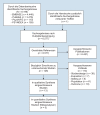[Impact of wearing face masks in public to prevent infectious diseases on the psychosocial development in children and adolescents: a systematic review]
- PMID: 34694428
- PMCID: PMC8543771
- DOI: 10.1007/s00103-021-03443-5
[Impact of wearing face masks in public to prevent infectious diseases on the psychosocial development in children and adolescents: a systematic review]
Abstract
Background: Wearing face masks in public is recommended under certain circumstances in order to prevent infectious diseases transmitted through droplets.
Aim: The objective was to compile all German and English research results from peer-reviewed journal articles using a sensitive literature search on the effects of mask-wearing for preventing infectious diseases on the psychosocial development of children and adolescents.
Methods: A systematic review was conducted considering different study designs (search period up until 12 July 2021). The risk of bias in the studies was determined using a risk of bias procedure. A descriptive-narrative synthesis of the results was performed.
Results: Thirteen studies were included, and the overall risk of bias was estimated to be high in all primary studies. There are some indications from the included surveys that children, adolescents, and their teachers in (pre)schools perceived facial expression processing as impaired due to mask wearing, which were confirmed by several experimental studies. Two studies reported psychological symptoms like anxiety and stress as well as concentration and learning problems due to wearing a mask during the COVID-19 pandemic. One survey study during the 2002/2003 SARS pandemic examined oral examination performance in English as a foreign language and showed no difference between the "mask" and "no mask" conditions.
Discussion: Only little evidence can be derived on the effects of wearing mouth-nose protection on different developmental areas of children and adolescents based on the small number of studies. There is a lack of research data regarding the following outcomes: psychological development, language development, emotional development, social behavior, school success, and participation. Further qualitative studies and epidemiological studies are required.
Zusammenfassung: HINTERGRUND: Zur Prävention tröpfchenübertragener Infektionskrankheiten wird das Tragen einer Maske im öffentlichen Raum unter bestimmten Bedingungen empfohlen.
Ziel der arbeit: Ziel war, über eine sensitive Literatursuche möglichst alle deutsch- und englischsprachigen Forschungsergebnisse aus begutachteten Fachzeitschriftenartikeln zu den Auswirkungen des Masketragens zur Prävention von Infektionen auf die psychosoziale Entwicklung von Kindern und Jugendlichen zusammenzutragen.
Methoden: Es wurde ein systematischer Review unter Berücksichtigung verschiedener Studiendesigns durchgeführt (Suchzeitraum bis einschließlich 12.07.2021). Das Verzerrungsrisiko der Studien wurde mit einem Risk-of-Bias-Verfahren ermittelt. Es fand eine deskriptiv-narrative Ergebnissynthese statt.
Ergebnisse: Es wurden 13 Studien eingeschlossen, wobei das Gesamtverzerrungsrisiko in allen Primärstudien als hoch eingeschätzt wurde. Es gibt Hinweise aus Befragungsstudien, dass die Fähigkeit zum Lesen der Mimik von Kindern/Jugendlichen und/oder ihren Betreuer:innen im (Vor‑)Schulsetting durch das Masketragen als beeinträchtigt erlebt wird, die durch mehrere Experimentalstudien bestätigt wurden. 2 Studien berichteten über psychische Symptome wie Ängste oder Stresserleben sowie Konzentrations- und Lernschwierigkeiten durch das Masketragen während der COVID-19-Pandemie. Eine Studie während der SARS-Pandemie 2002/2003 untersuchte mündliche Prüfungsleistungen in Englisch als Fremdsprache und zeigte keinen Unterschied zwischen den Bedingungen „Maske“ versus „keine Maske“.
Diskussion: Zu den Auswirkungen des Masketragens auf verschiedene Entwicklungsbereiche von Kindern und Jugendlichen lassen sich basierend auf der unzureichenden Studienlage nur wenige Erkenntnisse ableiten. Es fehlen Forschungsdaten zu den Folgen für die Endpunkte psychische Entwicklung, Sprachentwicklung, sozioemotionale Entwicklung, soziales Verhalten, Schulerfolg und Teilhabe. Weitere qualitative Studien und epidemiologische Studien sind unbedingt nötig.
Keywords: COVID-19; Child and adolescent; Face mask; Infectious disease; Mouth-nose protection; Prevention; Psychosocial development.
© 2021. The Author(s).
References
-
- WHO (2020) Advice on the use of masks in the context of COVID-19. Interim Guidance. World Health Organization. https://apps.who.int/iris/handle/10665/331693. Zugegriffen: 16. Okt. 2020
-
- RKI (2020) Mund-Nasen-Bedeckung im öffentlichen Raum als weitere Komponente zur Reduktion der Übertragungen von COVID-19. Robert Koch-Institut. https://www.rki.de/DE/Content/Infekt/EpidBull/Archiv/2020/Ausgaben/19_20.... Zugegriffen: 16. Okt. 2020
-
- WHO, UNICEF (2020) Advice on the use of masks for children in the community in the context of COVID-19. Annex to the Advice on the use of masks in the context of COVID-19. World Health Organization, United Nations Children’s Fund. https://www.who.int/publications/i/item/WHO-2019-nCoV-IPC_Masks-Children.... Zugegriffen: 5. März 2021
-
- Perleth M, Ledinger D, Stadelmaier J, Wichmann F, Siebert U, Zeeb H (2020) Gesichtsmasken zum Schutz vor Ansteckung bzw. Übertragung von SARS-CoV‑2. Version 02. Kompetenznetz Public Health zu COVID-19. https://www.public-health-covid19.de/images/2020/Ergebnisse/Gesichtsmask.... Zugegriffen: 2. Juni 2021
Publication types
MeSH terms
LinkOut - more resources
Full Text Sources
Medical
Miscellaneous



